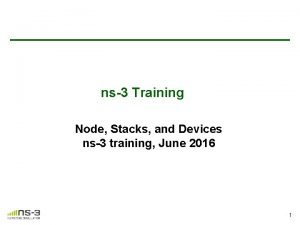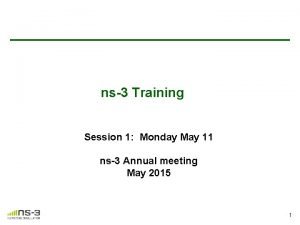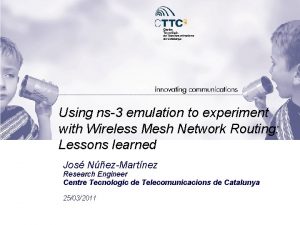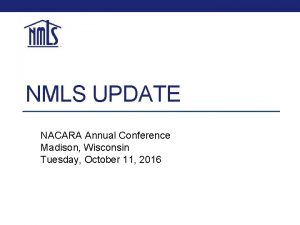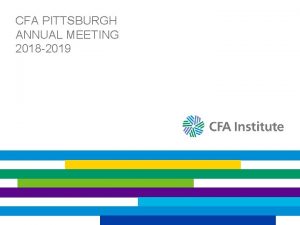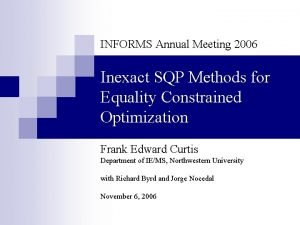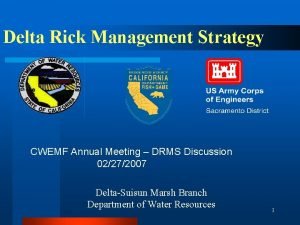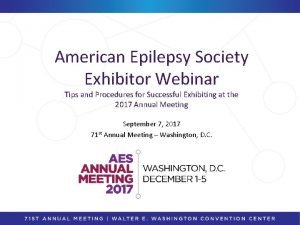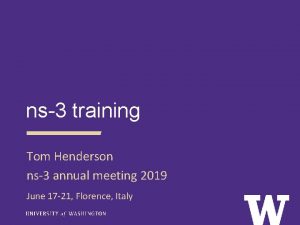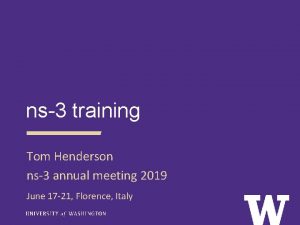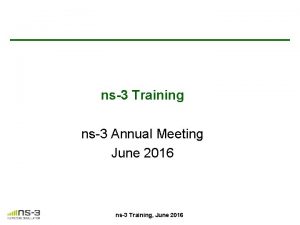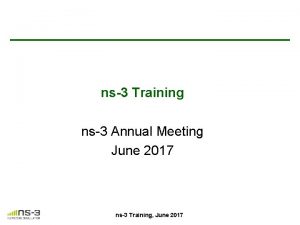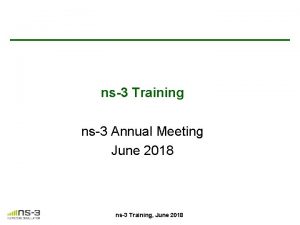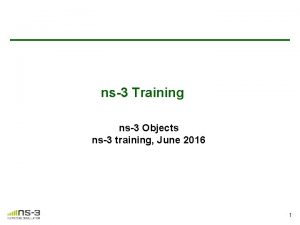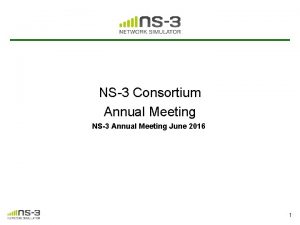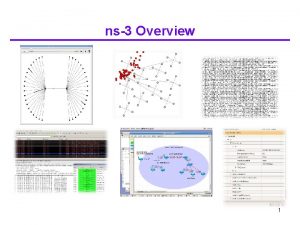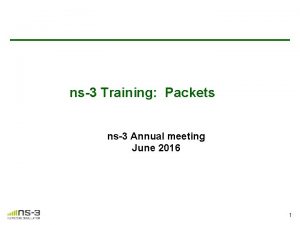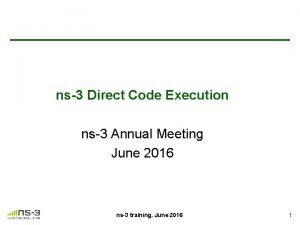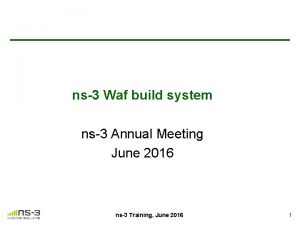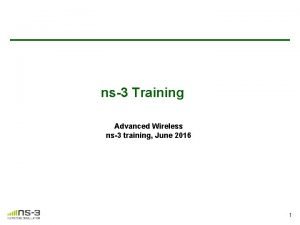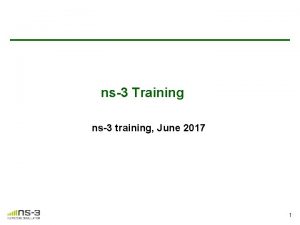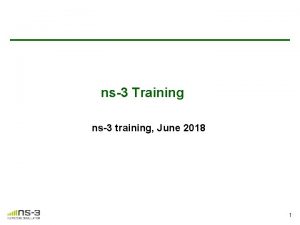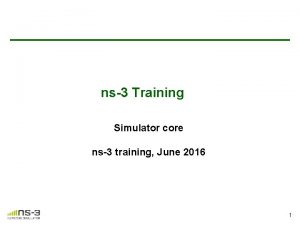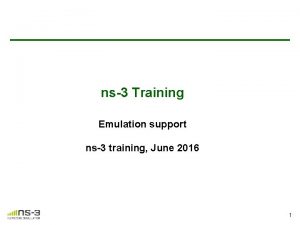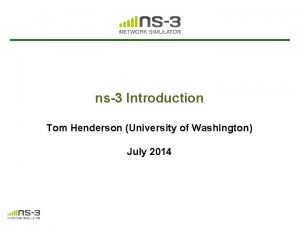ns3 training Tom Henderson ns3 annual meeting 2019




















- Slides: 20

ns-3 training Tom Henderson ns-3 annual meeting 2019 June 17 -21, Florence, Italy

ns-3 Packet • Packet is an advanced data structure with the following capabilities – Supports fragmentation and reassembly – Supports real or virtual application data – Extensible – Serializable (for emulation) – Supports pretty-printing – Efficient (copy-on-write semantics) ns-3 Annual meeting June 2019 2

ns-3 Packet structure • Analogous to an mbuf/skbuff ns-3 Annual meeting June 2019 3

Copy-on-write • Copy data bytes only as needed Figure source: Mathieu Lacage's Ph. D. thesis ns-3 Annual meeting June 2019 4

Headers and trailers • Most operations on packet involve adding and removing an ns 3: : Header • class ns 3: : Header must implement four methods: Serialize() Deserialize() Get. Serialized. Size() Print() ns-3 Annual meeting June 2019 5

Headers and trailers (cont. ) • Headers are serialized into the packet byte buffer with Packet: : Add. Header() and removed with Packet: : Remove. Header() • Headers can also be 'Peeked' without removal Ptr<Packet> pkt = Create<Packet> (); Udp. Header hdr; // Note: not heap allocated pkt->Add. Header (hdr); Ipv 4 Header iphdr; pkt->Add. Header (iphdr); ns-3 Annual meeting June 2019 6

Packet tags • Packet tag objects allow packets to carry around simulator-specific metadata – Such as a "unique ID" for packets or cross-layer info • Tags may associate with byte ranges of data, or with the whole packet – Distinction is important when packets are fragmented and reassembled • Tags presently are not preserved across serialization boundaries (e. g. MPI) ns-3 Annual meeting June 2019 7

Packet. Tag vs. Byte. Tag • Two tag types are available: Packet. Tag and Byte. Tag – Byte. Tags run with bytes – Packet. Tags run with packets • When Packet is fragmented, both copies of Packet get copies of Packet. Tags • When two Packets are merged, only the Packet. Tags of the first are preserved • Packet. Tags may be removed individually; Byte. Tags may be removed all at once ns-3 Annual meeting June 2019 8

Tag example • Here is a simple example illustrating the use of tags from the code in src/internet/model/udp-socket-impl. cc: Ptr<Packet> p; // pointer to a pre-existing packet Socket. Ip. Ttl. Tag tag. Set. Ttl (m_ip. Multicast. Ttl); // Convey the TTL from UDP layer to IP layer p->Add. Packet. Tag (tag); • This tag is read at the IP layer, then stripped (src/internet/model/ipv 4 -l 3 -protocol. cc): uint 8_t ttl = m_default. Ttl; Socket. Ip. Ttl. Tag tag; bool found = packet->Remove. Packet. Tag (tag); if (found) { ttl = tag. Get. Ttl (); } ns-3 Annual meeting June 2019 9

Packet metadata • Packets may optionally carry metadata – record every operation on a packet's buffer – implementation of Packet: : Print for pretty-printing of the packet – sanity check that when a Header is removed, the Header was actually present to begin with • Not enabled by default, for performance reasons • To enable, insert one or both statements: Packet: : Enable. Printing (); Packet: : Enable. Checking (); ns-3 Annual meeting June 2019 10

Ptr<Packet> • Packets are reference counted objects that support the smart pointer class Ptr • Use a templated "Create" method instead of Create. Object for ns 3: : Objects • Typical creation: – Ptr<Packet> pkt = Create<Packet> (); • In model code, Packet pointers may be const or non-const; often Packet: : Copy() is used to obtain non-const from const – Ptr<const Packet> cpkt =. . . ; – Ptr<Packet> p = cpkt->Copy (); ns-3 Annual meeting June 2019 11

Queues in ns-3 • Queues are objects for storing packets Enqueue Dequeue Common operations: Get. NBytes (); Get. NPackets (); etc. • A templated Queue class exists to support a few use cases – simple queues such as a Drop. Tail – Wifi. Mac. Queue – a Linux-like Queue. Disc class ns-3 training, June 2019 12

Linux-like TC architecture in ns-3 • Figure source: Stefano Avallone (2017 training) ns-3 training, June 2019 13

Debugging support • Assertions: NS_ASSERT (expression); – Aborts the program if expression evaluates to false – Includes source file name and line number • Unconditional Breakpoints: NS_BREAKPOINT (); – Forces an unconditional breakpoint, compiled in • Debug Logging (not to be confused with tracing!) – Purpose • Used to trace code execution logic • For debugging, not to extract results! – Properties • • NS_LOG* macros work with C++ IO streams E. g. : NS_LOG_UNCOND (”I have received ” << p->Get. Size () << ” bytes”); NS_LOG macros evaluate to nothing in optimized builds When debugging is done, logging does not get in the way of execution performance ns-3 training, June 2019 14

Debugging support (cont. ) • Logging levels: – – – – NS_LOG_ERROR (. . . ): serious error messages only NS_LOG_WARN (. . . ): warning messages NS_LOG_DEBUG (. . . ): rare ad-hoc debug messages NS_LOG_INFO (. . . ): informational messages (eg. banners) NS_LOG_FUNCTION (. . . ): function tracing NS_LOG_PARAM (. . . ): parameters to functions NS_LOGIC (. . . ): control flow tracing within functions • Logging ”components” – Logging messages organized by components – Usually one component is one. cc source file – NS_LOG_COMPONENT_DEFINE ("Olsr. Agent"); • Displaying log messages. Two ways: – Programatically: • Log. Component. Enable("Olsr. Agent", LOG_LEVEL_ALL); – From the environment: • NS_LOG="Olsr. Agent". /my-program ns-3 training, June 2019 15

Running C++ programs through gdb • The gdb debugger can be used directly on binaries in the build directory • An easier way is to use a waf shortcut. /waf --command-template="gdb %s" --run <programname> ns-3 training, June 2019 16

Running C++ programs through valgrind • valgrind memcheck can be used directly on binaries in the build directory • An easier way is to use a waf shortcut. /waf --command-template="valgrind %s" --run <program-name> • Note: disable GTK at configure time when running valgrind (to suppress spurious reports) • . /waf configure --disable-gtk --enable-tests. . . ns-3 training, June 2019 17

Testing • ns-3 models need tests verifiable by others (often overlooked) - Onus is on the simulation project to validate and document results Onus is also on the researcher to verify results • ns-3 strategies: – regression tests • Aim for event-based rather than trace-based – unit tests for verification – validation of models on testbeds where possible – reuse of code ns-3 training, June 2019 18

Test framework • ns-3 -dev is checked nightly on multiple platforms – Linux gcc-4. x, i 386 and x 86_64, OS X, Free. BSD clang, and Cygwin (occasionally) • . /test. py will run regression tests Walk through test code, test terminology (suite, case), and examples of how tests are run ns-3 training, June 2019 19

Improving performance • Debug vs optimized builds –. /waf -d debug configure –. /waf -d debug optimized • Build ns-3 with static libraries –. /waf --enable-static • Use different compilers (icc) – has been done in past, not regularly tested ns-3 training, June 2019 20
 Internet stack helper ns3
Internet stack helper ns3 Waf configure ns3
Waf configure ns3 Ns3 training
Ns3 training Nmls annual conference 2019
Nmls annual conference 2019 Cfa annual 2019
Cfa annual 2019 Cic annual report 2019
Cic annual report 2019 Informs annual meeting
Informs annual meeting Aupha annual meeting
Aupha annual meeting American psychiatric association annual meeting 2020
American psychiatric association annual meeting 2020 Grand lodge kentucky
Grand lodge kentucky Annual theory meeting
Annual theory meeting Cwemf annual meeting
Cwemf annual meeting How to run an annual general meeting
How to run an annual general meeting Nrg oncology semi annual meeting 2018
Nrg oncology semi annual meeting 2018 Aashto annual meeting 2015
Aashto annual meeting 2015 Scts membership
Scts membership Nrg oncology meeting
Nrg oncology meeting American epilepsy society annual meeting 2017
American epilepsy society annual meeting 2017 Go 910
Go 910 What does tom symbolize in the devil and tom walker
What does tom symbolize in the devil and tom walker What is ns3
What is ns3
